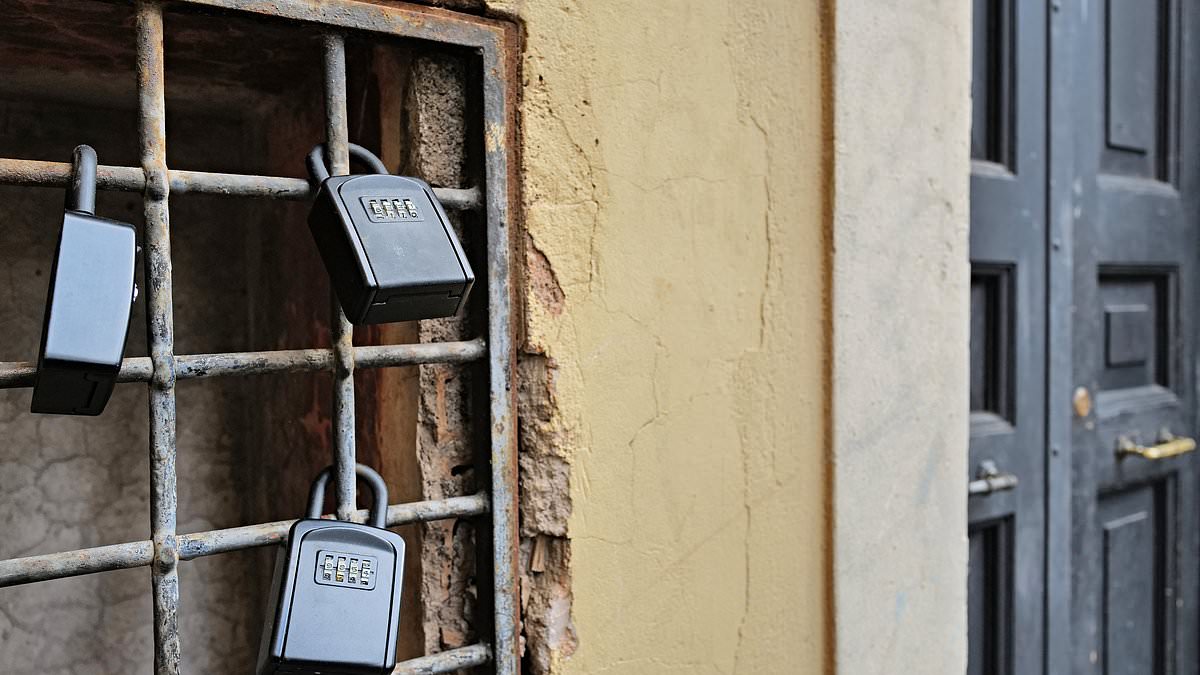Italy is to ban AirBnB metal key boxes in the country’s latest move to clampdown on over-tourism.
Authorities ruled on Tuesday that tourists must now meet the property owner in person to verify their identity.
The ban, which will come into effect next year, has been introduced for ‘reasons of national security’.
Vittorio Pisani, the national head of police, said the crackdown will help authorities keep tabs on ‘dangerous people’ or those ‘linked to terrorist organisations’.
Italian authorities are concerned that terrorists have started renting properties online using forged documents that are not being checked.
‘The need has arisen to implement stringent measures aimed at preventing threats to public order and safety linked to the possible housing of dangerous persons involved in criminal or terrorist organisations,’ Pisani said.
The ban is also understood to be a direct response to the surge in the number of short-term rentals such as AirBnB across Italy.
Metal key boxes have become a symbol for over-tourism in Venice, Florence, Rome, Naples and other cities.
They are often attached to gates, railings and posts and allow guests to access the property after receiving a code sent via SMS or email.
The ban was welcomed by Roberto Gualtieri, the mayor of Rome, who said the metal key boxes ‘ruin our streets’.
However, critics have argued the measure is ‘discriminatory’ and would harm local businesses.
The move comes following a series of popular revolts against AirBnbs and short-term lets in Italy this year.
Last month, campaigners in Milan vandalised metal key boxes across the city with their slogan ‘less short lets, more houses for all’.
‘Let’s limit tourist rentals, let’s protest those who want to expel us from the city with unsustainable rents for inaccessible houses,’ the campaigners wrote in a call for action in early November.
‘We want a city for all and the right to live in dignified housing,’ their statement said.
And In Florence, where nearly a third of the city’s flats are listed on Airbnb, protesters used stickers with the slogan ‘Let’s save Florence so we can live in it’.
Meanwhile in Rome, activists calling themselves Robin Hoods pulled several safes from properties in Rome, denying travellers access to their holiday lets.
Letters were attached to lampposts around the city under Robin Hood felt hats, describing the vandalism as ‘the first’ attack on ‘the rich’.
‘If you are looking for the key safes and can’t find them, read this. We are rebelling,’ a note read, shared by local media.
‘We have removed these key storage boxes to denounce the sell-out of the city to short-stay holidays which alienate locals and leave residents out on the streets.’
This summer has seen fierce backlash against tourists in Mediterranean hotspots, with locals decrying what they see as lax regulation on tourist accommodation that has made it more difficult to find affordable housing.
The rise of rental companies like Airbnb has seen some landlords move away from renting to residents in favour of letting out rooms or apartments to short-stay visitors.
This has reduced the overall supply of housing, pushing up the cost of rent.
The activists said rents had risen ‘exponentially’ in recent years. ‘This is only our first action against the Holy Year of the rich,’ their letters read.
More than 35 million tourists visited Rome last year, making it a record year and all-time high in attendance.
The year prior, as Rome built back from the pandemic, some 15 million arrived – with 30 million overnight stays climbing 176 per cent from 2021.
Next year, Rome and Vatican City will also host its jubilee ‘Holy Year’, expected to attract some 30 million visitors from around the world and piling extra pressure onto locals.
But some residents worry that keeping tourists away will affect their livelihoods or tarnish the reputation of their city.
Demonstrators clashed with police in Venice in April over a new ‘tourist tax’ imposition, requiring short stay visitors to pay an ‘entrance fee’ of €5.
Protesters armed with signs and banners lined the historic canals of the Italian city to show their contempt, met by riot police wielding batons.
Critics maintain that the €5 (£4.30) fee, initially in effect through the summer, is unlikely to put a significant dent in the circa 30 million trips made to Venice each year.
In a surprising statement, former mayor Massimo Cacciari went so far as to suggest tourists should flat-out refuse to pay the ‘absurd’ entrance fee, arguing they already ‘pay for everything’.
